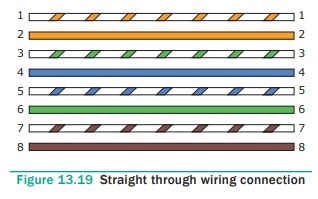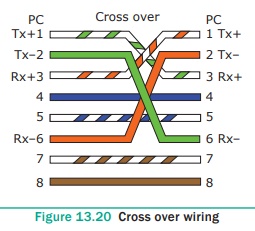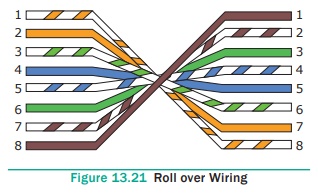Chapter: 12th Computer Applications : Chapter 13 : Network Cabling
Ethernet Cable Color Coding Techniques
Ethernet
Cable Color Coding Techniques
There are three types of wiring techniques to
construct the Ethernet cable. It is also known as color coding techniques. They
are
● Straight-Through
Wiring
● Cross-over
Wiring
● Roll-over
Wiring
1. Straight-Through Wiring
In general, the Ethernet cables used for Ethernet
connections are “straight-through cables”. These cable wires are in the same
sequence at both ends of the cable, which means that pin 1 of the plug on one
end is connected to pin 1 of the plug on the other end (for both standard –
T568A & T568B). the straight through wiring cables are mostly used for
connecting PC / NIC card to a hub. This is a simple physical connection used in
printers, computers and other network interfaces. See Figure 13.19

2. Cross-over Wiring
If you require a cable to connect two computers or
Ethernet devices directly together without a hub, then you will need to use a
Crossover cable instead. Then the pairs(Tx and Rx lines) will be crossed which
means pin 1 & 2 of the plug on one end are connected with pin 3 & 6 of
the plug on other end, and vice versa (3 & 6 to pin 1 & 2).
The easiest way to make a crossover cable is to
make one end to T568A colour coding and the other end to T568B. Another way to
make the cable is to remember the colour coding used in this type. Here Green
set of wires at one end are connected with the Orange set of wires at another
end and vice versa. Specifically, connect the solid Green (G) with the solid
Orange, and connect the green/white with the orange/white. See Figure 13.20

3. Roll-over Wiring
Rollover cable is a type of null-modem cable that
is often used to connect a device console port to make programming changes to
the device. The roll over wiring have opposite pin arrangements, all the cables
are rolled over to different arrangements. In the rollover cable, The coloured
wires are reversed on other end i.e. The pins on one end are connected with
other end in reverse order (i.e. pin 1 to 8, 2 to 7, 3 to 6, 4 to 5, 5 to 4, 6
to 3, 7 to 2, 8 to 1).
Rollover cable is also known as Yost cable or
Console cable. It is typically flat (and light blue color) to distinguish it
from other types of network cabling.

These three arrangements are used to perform an
interface change. But, all the three arrangements transmits the data at the
same speed only. See Figure 13.21
How to determine the type of Ethernet cables?
Straight-through: The coloured wires
are in the same sequence at both ends of the cable.
Cross-over: The first coloured wire at one end
of the cable is the third coloured wire at the other end of the cable.
Roll-over: The coloured wires are in the
opposite sequence at either end of the cable.
Related Topics